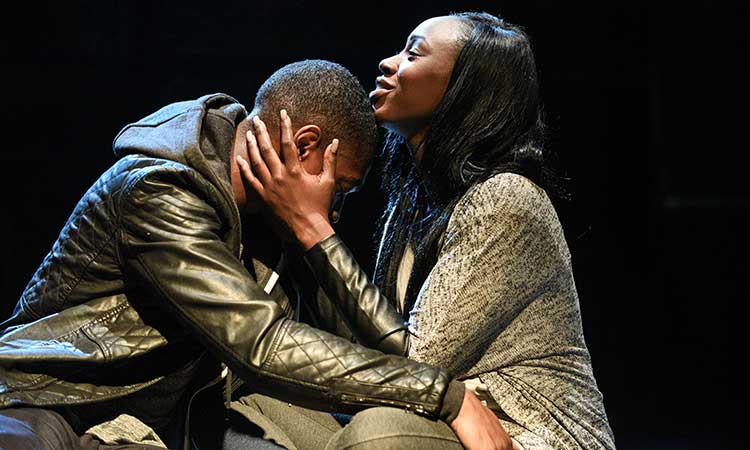
Writer Roy Williams knew how: by taking the themes of Antigone – war, family, power, loyalty, defiance – and transplanting them to a tale of gang warfare.
The shocking story tells how Creon, desperate to gain control over a city ravaged by civil war, refuses to bury the body of Antigone’s rebellious brother.
Outraged, she defies his edict. Creon condemns the young woman, his niece, to be buried alive.
Williams’ adaptation for Pilot Theatre runs at the York Theatre Royal from Tuesday, October 21 to Saturday, October 25. Here Roy and Pilot’s artistic director Marcus Romer explain why this classic story will resonate for a new generation.
Writer Roy Williams
Why this setting for Antigone?
I was intrigued to know if it was possible to set Antigone in a world that I have written about before, ie the gangster culture that is too often the life of a lot of young people today.
It has always disturbed me to hear young people say that being in a gang makes them feel powerful. But as we all know power does corrupt.
Creon begins the play feeling all-powerful with his gang running ‘tings’ in Thebes. It is almost like he and others like him, have put aside other feelings that make us human, like love and fear, in favour of a “live fast, die young” mentality.
What surprised you about today’s gangs?
When I have met young people while researching for plays about gang culture, I’ve been really surprised to hear them talking about themselves in military terms.
They refer to themselves as soldiers and talk about gang culture like it is war. That whole notion of gang members seeing themselves as soldiers in a war is something that can be really well explored with the story of Antigone.
How do you feel about that?
I absolutely despise the whole notion. When young people feel it is acceptable to live their lives that way it offends me. It offends me that they feel like they must live like that.
Why is Antigone so powerful?
It’s dramatic, it’s brilliantly structured, it just speaks to me. There is something about the defiance of Antigone that I find fascinating. When she tries to bury her brother constantly, in defiance of Creon, it is an incredibly dramatic facet of the story.
How did you go about adapting it?
I let the original text do the work for me. It is my original take on the story, it begins and ends in the same way, all the beats of the story are the same as the original and the characters remain, but it is my take with the characters in the world that I have moved them into.
Pilot brings theatre to younger audiences. Why is that important?
Theatre is a way for young people to see themselves and their lives through drama. I think that’s really important and I see it as a responsibility to get young people through the doors of a theatre and to realise that their lives are important to be represented on stage.

Director Marcus Romer
This is a predominantly black cast. Why have you made that decision?
It’s something that’s in the air at the minute, something that people are talking about, the fact that we need to start reflecting wider society on our stages – Pilot has been doing it for decades.
When we take work around the country, and we are touring this nationally, then that’s what the audience looks like – incredibly multi-cultural.
It’s not even about finding the audiences or anything like that, necessarily, it’s just that this is what we do, it’s the work I want to make – this is what England looks like and it simply makes sense to me to show that on stage.
Our lead is a black woman playing the part of Antigone. Would that have happened on other stages around the country? Probably not – and that’s not to do with lack of ability, it’s just that other theatres wouldn’t cast this play in the way that we have.
As this is Pilot, no doubt technology will play a part?
People seem to think that Pilot is ahead of the game when it comes to using technology, because we use video and music and that sort of stuff in a way that isn’t typical.
The truth is though, we have lots of technology available to us in the theatre – we have lighting desks and automatic machinery that brings in scenery and takes it out – that’s all technology.
We look at the other technology that is out there – like digital technology – and work out how we can use it. We’re using what’s in the toolbox – and the toolbox is getting bigger.
Why do you think Antigone will appeal to Pilot’s teenage audience?
Young people are faced with extreme circumstances. This is a play about extreme circumstances: it’s about power struggles and corruption and defiance and betrayal – there is a reason the story is still being told after 2,000 years.
What’s next on the horizon for Pilot?
We’ve got several projects that we’re working on, but for me the biggest thing we have to do over the next three years is remain creative.
We’ve built into our planning for the next three years what I call ‘airlock spaces’. It’s a slot in the schedule where we haven’t planned anything, where we don’t have anything on the slate, because that means we can respond to what’s going on around us.
I want us to be light on our feet and able to respond to what is in the news and what people are talking about.
Antigone is at York Theatre Royal from Tuesday, October 21 to Saturday, October 25. More details on the theatre’s website
